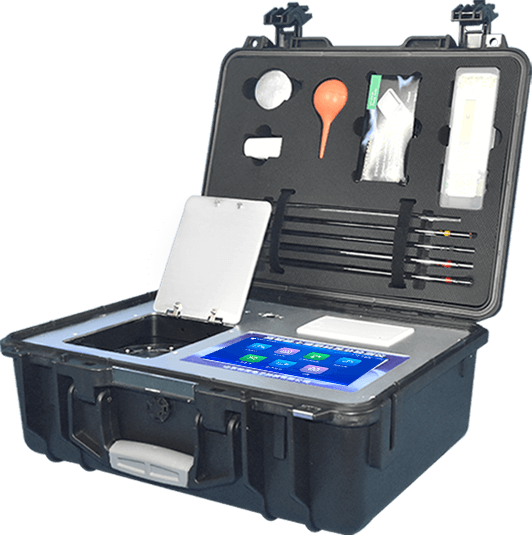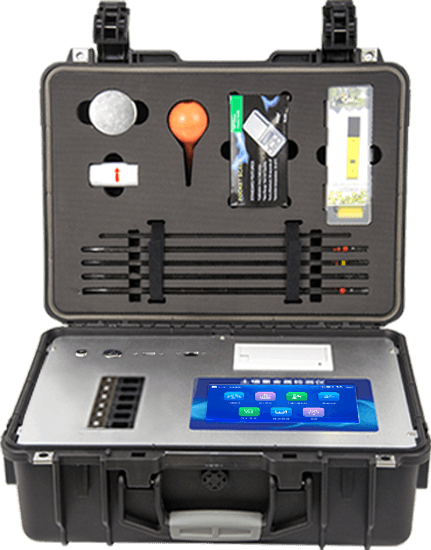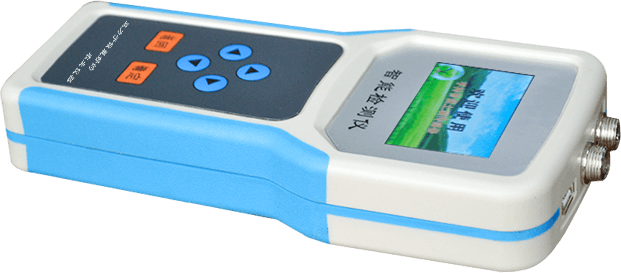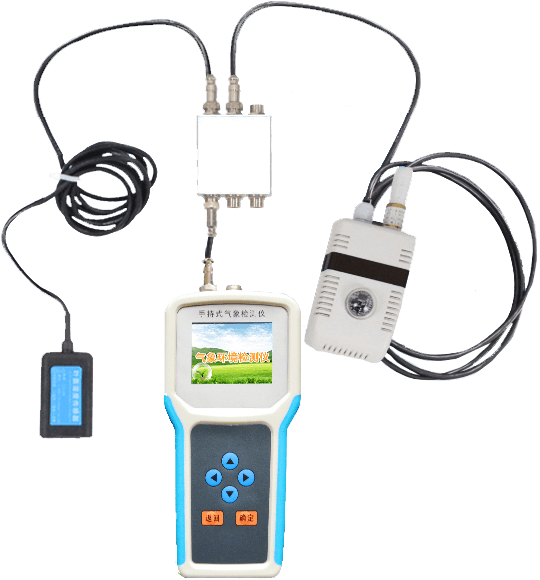
Organic Fertilizer Carbon-to-Nitrogen Ratio Tester
- Product Number:LD-TN2
- Product Difference:12 rotating detection channels detect various soil nutrients and fertilizer nutrients, improving detection efficiency and reducing detection costs
Product Introduction
Total organic carbon and carbon-to-nitrogen ratio in soil and fertilizers are two distinct indicators used to characterize the properties of organic matter in soil and fertilizers.
1. Total organic carbon and carbon-to-nitrogen ratio in soil:
Total organic carbon in soil refers to the total amount of organic carbon present in the soil, including plant and animal residues, microorganisms, organic fertilizers, etc. The total organic carbon content in soil is one of the key indicators for assessing soil quality and health, as it significantly influences soil fertility, water retention capacity, and ecosystem functions.
The carbon-to-nitrogen ratio in soil can be determined based on the analysis results of soil samples. Generally, soil organic carbon content is typically higher, while organic nitrogen content is relatively lower. Therefore, the typical range for the soil carbon-to-nitrogen ratio is usually between 10:1 and 20:1. Factors such as soil type, soil texture, vegetation type, and management practices can influence the soil carbon-to-nitrogen ratio, so specific values may vary. Its significance lies in providing information about soil nutrient cycling and organic matter decomposition.
A low carbon-to-nitrogen ratio (lower values) typically indicates faster organic matter decomposition in the soil, relatively higher organic nitrogen content, and potentially higher soil fertility. A high carbon-to-nitrogen ratio (higher values) typically indicates slower organic matter decomposition in the soil, relatively lower organic nitrogen content, and potentially lower soil fertility. Therefore, an appropriate carbon-to-nitrogen ratio helps maintain soil health and fertility.
2. Total organic carbon and carbon-to-nitrogen ratio of fertilizers:
The total organic carbon content of organic fertilizers and compost depends on the type of raw materials and the processing methods used in the composting process. Generally, compost contains higher total organic carbon, while the total organic carbon content of organic fertilizers varies depending on their raw materials. Understanding its total organic carbon content is crucial for assessing its nutrient supply capacity and soil improvement effects. These indicators can guide the selection and proper application of organic fertilizers to meet crop nutrient requirements and improve soil quality and ecosystem health.
The carbon-to-nitrogen ratio of organic fertilizers can vary significantly, depending on the type of organic fertilizer and its raw material composition. Generally, organic fertilizers have a lower carbon-to-nitrogen ratio, typically ranging from 10:1 to 20:1. Different types of organic fertilizers have different carbon-to-nitrogen ratios. For example, the carbon-to-nitrogen ratio of poultry manure is approximately 10:1 to 15:1, while the carbon-to-nitrogen ratio of legume plant residues may be closer to 20:1. Additionally, the processing methods, raw material proportions, and decomposition extent during composting also influence the carbon-to-nitrogen ratio of organic fertilizers.
The following parameters can be tested:
1. Soil nutrients:
① Total organic carbon (TOC) in soil, carbon-to-nitrogen ratio in soil, ammonium nitrogen, available phosphorus in soil, available potassium in soil, nitrate nitrogen in soil, hydrolyzable nitrogen in soil, total nitrogen in soil, total phosphorus in soil, total potassium in soil, soil organic matter (Chulim method), soil organic matter (extraction method), pH value, salinity, moisture content.
② Soil trace elements: soil calcium, soil magnesium, soil sulfur, soil silicon, soil boron, soil iron, soil copper, soil manganese, soil zinc, soil chlorine.
③ Soil heavy metals: soil lead, soil arsenic, soil cadmium, soil chromium, soil mercury.
2. Fertilizer nutrients:
① Total organic carbon (TOC) in organic fertilizer, carbon-to-nitrogen ratio in organic fertilizer, total nitrogen, total phosphorus in organic fertilizer, total potassium in organic fertilizer, nitrate nitrogen in organic fertilizer, available phosphorus in organic fertilizer, available potassium in organic fertilizer, acid-hydrolyzable nitrogen in organic fertilizer, organic matter.
② Compound fertilizer carbon-to-nitrogen ratio, total nitrogen, total phosphorus in compound fertilizer, total potassium in compound fertilizer.
③ Water-soluble fertilizer carbon-to-nitrogen ratio, total nitrogen, total phosphorus in water-soluble fertilizer, total potassium in water-soluble fertilizer.
④ Foliar fertilizer carbon-to-nitrogen ratio, total nitrogen, total phosphorus in foliar fertilizer, total potassium in foliar fertilizer.
⑤ Water-soluble humic acid (lignite), water-soluble humic acid (brown coal), water-soluble humic acid (peat), free humic acid (lignite), free humic acid (brown coal), free humic acid (peat).
⑥ Elemental fertilizers: ammonium nitrogen in nitrogen fertilizers, nitrate nitrogen in fertilizers, urea nitrogen, urea formaldehyde, phosphorus in phosphorus fertilizers, water-soluble phosphorus in phosphorus fertilizers, potassium in potassium fertilizers.
⑦ Various trace elements in fertilizers: calcium in fertilizers, magnesium in fertilizers, sulfur in fertilizers, silicon in fertilizers, boron in fertilizers, iron in fertilizers, copper in fertilizers, manganese in fertilizers, zinc in fertilizers, and chlorine in fertilizers.
⑧ Heavy metals in fertilizers: lead in fertilizers, arsenic in fertilizers, cadmium in fertilizers, chromium in fertilizers, and mercury in fertilizers.
Product Features
Android smart operating system, main control chip uses ARM Cortex-A7, RK3288/4-core processor, main frequency 1.88Ghz, faster running speed, stronger stability.
Features a precision rotating colorimetric cell design (Patent No.: ZL 2018 2 1777724.7), ensuring consistent light source accuracy and maintaining detection precision.
Equipped with 12 rotating detection channels, enabling rapid testing of 12 samples simultaneously, significantly enhancing testing efficiency and reducing costs.
Utilizes high-precision filter technology with an independently developed analytical method (Patent No.: ZL 2020 2 1763837.9), certified by authoritative institutions.
Built-in calibration functionality during testing, intelligent constant current voltage regulation, and automatic light intensity calibration ensure testing accuracy, with a Calibration Certificate issued by the China National Institute of Metrology.
The instrument comes standard with Wi-Fi wireless uploading, 4G network transmission, and GPRS wireless remote transmission functionality for rapid data uploading.
Equipped with a smart cloud agriculture platform, the instrument can upload detection data selectively or in batches via wireless network after connecting to the wireless network, facilitating long-term data management and visualization analysis for users.
The instrument also features a USB interface, Ethernet interface, and built-in large-capacity memory, and data can be copied to a USB drive at any time.
Users can log in to the cloud platform via mobile phone to view historical data online at any time.
The instrument is equipped with a crop expert fertilization system that calculates recommended fertilization amounts for over 100 types of national agricultural crops and fruit trees based on target yields. It provides scientific guidance for agricultural production based on fertilization formulas. Soil testing and fertilization results can be printed, with the printout including: crop type, fertilizer type, target yield, total requirement, and recommended fertilization plan.
Built-in plant nutrient diagnosis standard spectrum, which compares leaf images based on pictures of nutrient deficiencies in various crops to diagnose nutrient deficiencies.
4-wavelength professional testing cold light source (red, blue, green, orange), with stable light source wavelengths, no temperature drift during prolonged continuous operation, a lifespan of up to 100,000 hours, excellent reproducibility, and high accuracy.
The colorimetric cell uses standard 1cm colorimetric cuvettes, with no mechanical displacement or wear, precise optical path testing and positioning, effective shielding against external light interference, ensuring test results exceed national standards.
The instrument system includes sample pretreatment operation videos. Various sample testing methods can be viewed by clicking the video module, eliminating the need for operators to study manuals, facilitating quick guidance and training, and enabling new users to operate efficiently.
The instrument is equipped with a new-generation high-speed thermal printer (no ribbon required), which prints the following information: testing unit, tester, testing item, channel number, absorbance, nutrient content (mg/kg), testing time, and QR code.
High-sensitivity 7-inch true-color touchscreen with more efficient and user-friendly operation, high-definition and high-interactivity display, significantly reducing the cumbersome operations and errors of traditional instruments, and obtaining multiple software copyrights.
Built-in clock function for convenient recording of operation time and long-term historical traceability.
Supports multiple user accounts with password-protected login, featuring an efficient UI interface. Different users can freely add and edit testing information, which can be saved for long-term use.
GPS functionality: records latitude and longitude locations during fieldwork, meeting the needs of special users.
Built-in low voltage warning function to clearly indicate battery level during testing, preventing data drift. Also features power failure protection, automatically saving data upon power loss to prevent data loss.
Dual AC/DC power supply mode with a built-in high-capacity rechargeable lithium battery, capable of continuous operation for over 10 hours when fully charged. Also supports external vehicle power supply charging.
The instrument features a Chinese-English language switching function to meet export requirements.
High-strength PVC engineering plastic carry case design, durable and easy to carry.
Product parameters
| Power Supply | AC 220±22V, DC 12V+5V (the instrument's built-in lithium battery can also be used with a car power supply) |
| Power | ≤5W |
| Range and resolution | 0.001-9999 |
| Repeatability error | ≤0.02% (0.0002, potassium dichromate solution) |
| Instrument stability | ① No drift in displayed values within one hour (transmittance measurement) ② Drift in displayed values does not exceed 0.3% (0.003, transmittance measurement) or 0.001 (absorbance measurement) within two hours |
| Linear error | ≤0.1% (0.001, copper sulfate detection) |
| Sensitivity | Red light ≥4.5 ×10⁻⁵, blue light ≥3.17×10⁻³, green light ≥2.35×10⁻³, Orange light ≥ 2.13 × 10⁻³ |
| Wavelength range | Red light: 680 ± 2 nm, Blue light: 420 ± 2 nm, Green light: 510 ± 2 nm, Orange light: 590 ± 4 nm |
| pH value (acidity/alkalinity) | ① Test range: 1–14, ② Accuracy: 0.01, ③ Error: ±0.1 |
| Salinity (conductivity) | ① Test range: 0.01%–1.00%, ② Relative error: ±5% |
| Soil moisture technical parameters | ① Moisture unit: % (g/100g), ② Moisture content test range: 0–100%, ③ Error less than 0.5% |
| Test efficiency | Simultaneous extraction and determination of multiple nutrients such as readily available N, P, and K in soil (drafted by the Ministry of Agriculture's rapid testing industry standard). Simultaneous, rapid, and accurate detection of nutrients such as nitrogen (N), phosphorus (P), and potassium (K) in fertilizers. Testing speed, under normal proficiency: Testing one soil sample (N, P, K) takes 20 minutes (including reagent preparation and soil sample pretreatment time), testing three soil samples (N, P, K) simultaneously takes ≤40 minutes, and testing eight soil samples simultaneously takes ≤1 hour. Testing one fertilizer sample (N, P, K) takes ≤50 minutes, and testing three fertilizer samples (N, P, K) simultaneously takes ≤1.5 hours. |
| Testing error | Soil nitrogen, phosphorus, and potassium error ≤1%, organic matter error ≤2%, trace element relative error ≤5%, fertilizer single-item error ≤0.5%, Nitrogen, phosphorus, and potassium three-item error ≤1%, heavy metal relative error ≤5% |
| Display resolution | 1024×600 |
| Shock resistance rating | IP65 |
| Dimensions and weight | 48×34.5×22 cm, 5.2 kg |


 +86 19353291814
+86 19353291814




